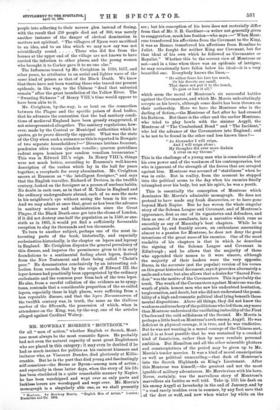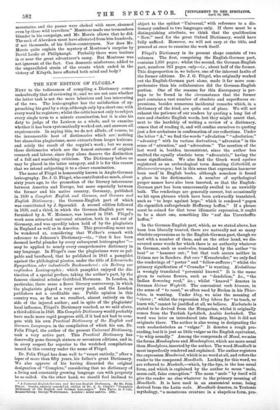MR. MOWBRAY MORRIS'S " MONTROSE."*
OF all "men of action," whether English or Scotch, Mont- rose must always be the most romantic figure. He probably had not even the natural capacity of most great Englishmen who are placed in this category; it may even be doubted if he had as much instinct for politics as his eminent kinsman and imitator who, as Viscount Dundee, died gloriously at Killie- crankie. But he is the poet that died young and fascinatingly self-conscious—the Burns or Byron—among men of action ; and especially in these latter days, when the story of his life has been elucidated in a quite remarkable manner by Napier, he has been worshipped and wept over as only poets and luckless lovers are worshipped and wept over. Mr. Morris's monograph is a singularly able one, as we shall presently
• Mont rose. Ry Mowbray Morris. " Englieh Men of Action." London: Macmillan and Co. 1892.
see ; but his conception of his hero *does not materially differ from that of Mr. S. R. Gardiner—a writer not generally given to exaggeration, much less fustian—who says :—" When Mont- rose transferred his affections from the Covenant to the King, it was as Romeo transferred his affections from Rosaline to Juliet. He fought for neither King nor Covenant, but for that ideal of his own which he followed as Covenanter or Royalist." Whether this be the correct view of Montrose or not—and in a time when there was an epidemic of intrigue,
he may occasionally have fallen below his ideal—it is a very beautiful one. Everybody knows the lines,-
" He either fears his fate too much, Or his deserts are small, That dares not put it to the touch, To gain or lose it all,"
which seem the moral of Montrose's six successful battles against the Covenanters, and which Mr. Morris unhesitatingly accepts as his hero's, although some doubt has been thrown on their authorship. Here we have the Montrose who is the darling of fiction,—the Montrose of fact after he had crossed his Rubicon. But there is the other and the earlier Montrose, who tried to play bowls with the sinister Argyll, the Montrose of " The Cumberland Bond " and " The Incident," who led the advance of the Covenanters into England; and is he not to be found in the other and less known lines F-
" As Alexander I will reign, And I will reign alone ;
My thoughts did ever more disdain A rival on my throne."
This is the challenge of a young man who is conscious alike of his own power and of the weakness of his contemporaries, but who is ignorant of the strength of the forces that are arrayed against him. Montrose was accused of "stateliness" when he was in exile. But in reality, from the moment he stepped into the political arena to the day when his enemies finally triumphed over his body, but not his spirit, he was a youth.
This is essentially the conception of Montrose which dominates Mr. Morris's admirable monograph. He does not pretend to have made any fresh discoveries, or to have gone beyond Mark Napier. But he has woven the whole singular story of the Solemn League and Covenant, and of Montrose's appearance, first as one of its signatories and defenders, and then as one of its assailants, into a narrative which runs as smoothly as any of Macaulay's beat chapters. While he is animated by, and frankly avows, an enthusiasm amounting almost to a passion for Montrose, he does not deny the good intentions of the great mass of his enemies. One of the most readable of his chapters is that in which he describes the signing of the Solemn League and Covenant in Edinburgh ; and he allows that the majority of those who appended their names to it were sincere, although the majority of their leaders were the very opposite. Burns, in the accurate (not the popular) version of his verses on this great historical document, says it provokes alternately a smile and a tear; but also allows that a desire for "Sacred Free- dom" was the motive of the Covenanters. This is probably the truth. The wrath of the Covenanters against Montrose was the wrath of plain, honest men who saw his undoubted hesitation, tergiversation, and deceit, but who did not understand the possi- bility of a high and romantic political ideal lying beneath these mental dispositions. Above all things, they did not know the weakness and treachery of the politicians who led them, any more than Montrose understood the vacillating imbecility of the First Charles and the cold selfishness of the Second. Mr. Morris is perhaps a little hard on Montrose's arch-enemy, Argyll. He was deficient in physical courage, it is true, and he was vindictive.
But he was not wanting in a moral courage of the Chinese sort, and it is at least possible that he was sustained by a crooked kind of fanaticism, rather than by mere resolute personal ambition. But Hamilton and all the other miserable plotters and connterplotters of the period may be given up to Mr.
Morris's tender mercies. It was a kind of moral emancipation as well as political unmuzzling,—tbat dash of Montrose's
into the Scotch Highlands as King's Lieutenant. After this Montrose was himself,—the greatest and not the most ignoble of military adventurers. Mr. Morris rises with his hero. Never, certainly, was the marvellous story of Montrose's marvellous six battles so well told. Take (p. 153) his dash on his enemy Argyll at Inverlocby in the end of January, and by "a road rarely trodden even in summer, by any foot save that of the deer or wolf, and now when winter lay white on the
mountains, and the passes were choked with snow, shunned even by these wild travellers." Montrose made one tremendous blunder in his campaign, and Mr. Morris allows that he did. The sack of Aberdeen must have alienated from him hundreds, if not thousands, of his fellow-countrymen. Nor does Mr. Morris quite explain the mystery of Montrose's surprise by David Leslie at Philiphaugh. Probably there were traitors in or near the great adventurer's camp. But Montrose was not ignorant of the fact. Can domestic misfortune, added to the unparalleled strain of the events which ended in the victory of Kilsyth, have affected both mind and body P



















































 Previous page
Previous page